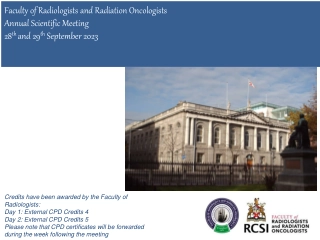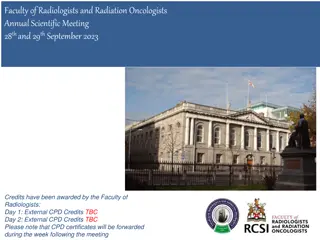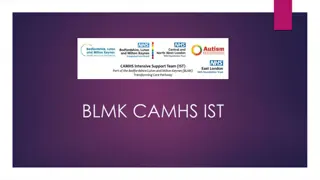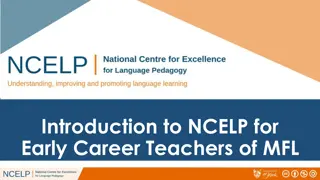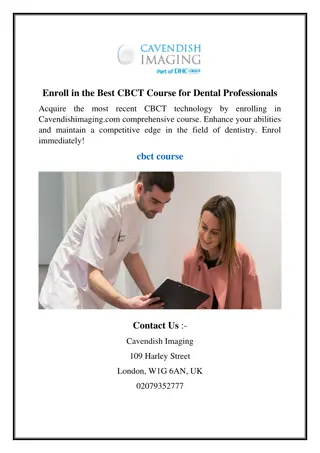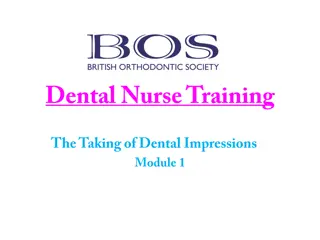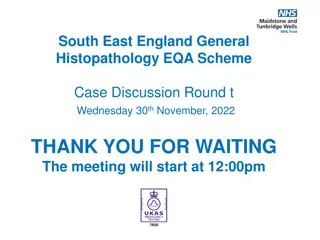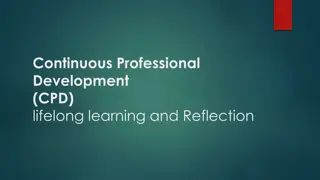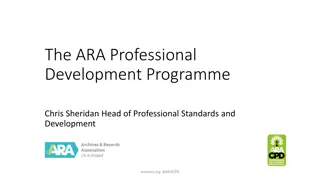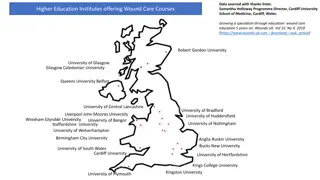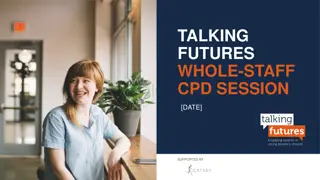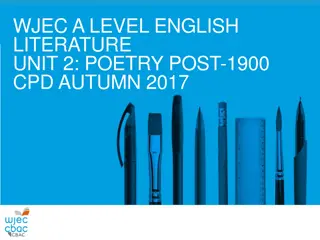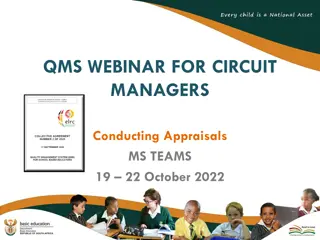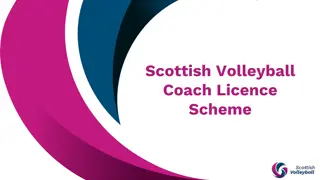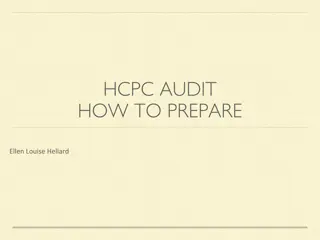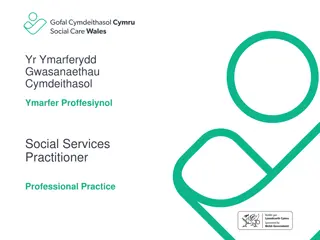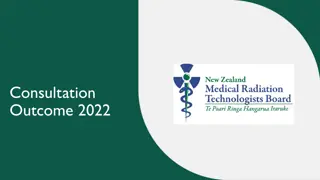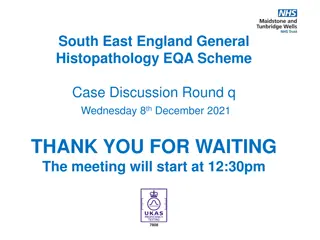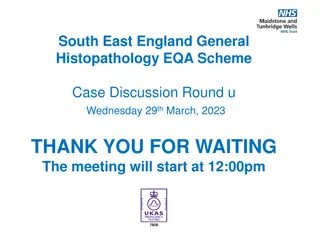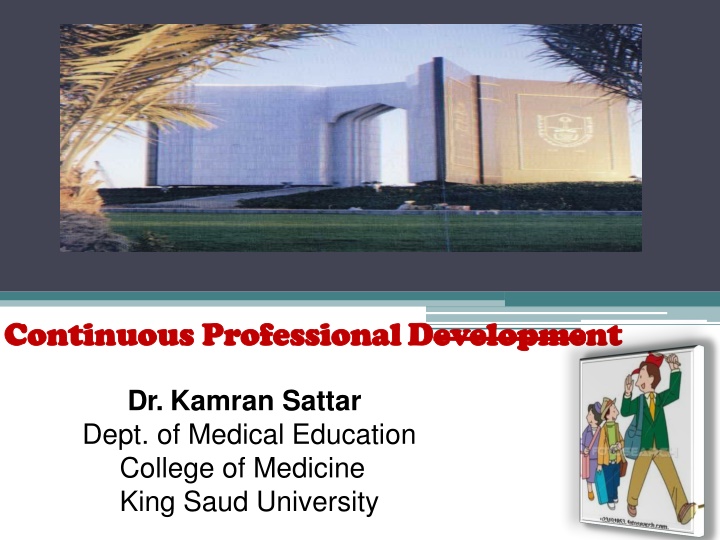
Competence Development in Medical Education at King Saud University
Explore the focus on competence development in medical education at King Saud University, emphasizing continuous professional development, reflective learning, and overcoming challenges. Understand the core competencies required by medical colleges in Saudi Arabia and the national competence framework for Saudi medical graduates.
Uploaded on | 0 Views
Download Presentation

Please find below an Image/Link to download the presentation.
The content on the website is provided AS IS for your information and personal use only. It may not be sold, licensed, or shared on other websites without obtaining consent from the author. If you encounter any issues during the download, it is possible that the publisher has removed the file from their server.
You are allowed to download the files provided on this website for personal or commercial use, subject to the condition that they are used lawfully. All files are the property of their respective owners.
The content on the website is provided AS IS for your information and personal use only. It may not be sold, licensed, or shared on other websites without obtaining consent from the author.
E N D
Presentation Transcript
Continuous Continuous Professional ProfessionalD Developme evelopment nt Dr. Kamran Sattar Dept. of Medical Education College of Medicine King Saud University
: Allah loves when one of you to do it well
http://www.healthandsafetyatwork.com/hsw/risk-assessment/competencehttp://www.healthandsafetyatwork.com/hsw/risk-assessment/competence
Objectives By the end of today s session the students should be able to; 1.Understand what is Competence and differentiate its Levels? 2. Plan for their own Continuous Prof: Devp: (CPD) 3. Appraise, what is Reflective Learning and how to utilize it in day to day learning ? 4. Identify Challenges hindering CPD and learn how to overcome
WHAT MEDICAL COLLEGES WANT? http://teresachinn.co.uk/is-nursing-competence-evident-online/
WHAT MEDICAL COLLEGES WANT? Competence Proficiency Communication skills Interpersonal skills Confidence Critical thinking & problem solving skills Flexibility Self motivation Leadership Teamwork Cont.:
Deanship of all Medical Colleges In Saudi Arabia, a national call to define the competencies of medical graduates has been given a higher priority with the expansion of medical education in the Kingdom (BinAbdulrahman 2008, 2011).
Core competencies The national competence framework that has been developed by medical schoolsin the Kingdom of Saudi Arabia (SAUDIMEDS) Saudi Meds: A competence specification for Saudi medical graduates RANIA G. ZAINI, KHALID A. BIN ABDULRAHMAN, ABDULAZIZ A. AL-KHOTANI, ABDOL MONEM A. AL-HAYANI, IBRAHIM A. AL-ALWAN & SADDIG D. JASTANIAH Medical Teacher, 2011; 33:582 584
KSU Medical College Outcomes 1. Communication and consultationskills 2. Clinicalcare 3. Health promotion and disease prevention 4. The family and community context of healthcare 5. Personal professional development 6. Use of technology and information gathering 7. Attitudes, ethics and professionalism 8. Research
Think, Pair & Share Every five of you. Why We Are Here? TO HELP
Levels of competence: Consultant Registrar Resident Intern Medical student
Levels of competence Medicalstudent Intern Resident Registrar Consultant Advanced beginner Novice Competent Proficient Expert
Think, Pair & Share Every five of you. What is your definition of COMPETENCE ?
Definition of competence: The ability to perform aspecific task in a manner thatyields desirable outcomes .
Different Aspects of Competence Knowledge Skills Abilities Competence develops over time and is nurtured by reflection on experience
Attitudes Attitudes Does Skills Skills Professionalism Showshow Knowshow K Kn no owledg wledge e/ / Cognition Cognition Knows Miller s Pyramid
Blooms Taxonomy Evaluation Synthesis Analysis Application Comprehension Knowledge
Hierarchy of Knowledge Bloom sTaxonomy, 1956 Knowledge - What is themost common causeof...? Understand - If you see this,what must you consider ? Application - In this patient,what iscausing ? Analysis,synthesis,evaluation - critical thinking?
Think, Pair & Share Every five of you. What is your definition of Skills ?
Skills Skill is the capacity to perform specificactions A person s skill is a function of both knowledge and the particular strategies used to apply knowledge.
Abilities The power or capacity to do something or act physically, mentally, legally, morally, etc.
Ability Skill is the generic make up is something that can of an individual either be learned or acquired perceptual or motor in through training and nature that can be can be cognitive, inherited from one's perceptual and motor parents.
Ability Skill (Innate) (Acquired ) can be taught and/or is performance, or what learned you are able to do.
Skill + Ability What you have learned to do and What you can actually do!
How is competence acquired: It is gained in the healthcare professions through: pre-service education in-service training workexperience (CPD). Continuous Professional Development (CPD).
Think Pair & Share Every five of you Are you involved in CPD ?
Continuing Professional Development (CPD)
What is CPD? The conscious updating of professional knowledge and the improvement of professional competence throughout a person's working life.
What is CPD? Cont: It is a commitment to being professional, keeping up to date and continuously seeking to improve. It is the key to optimizing a person's career opportunities, both today and for the future.
Why CPD? Requirement by the governing bodies of the profession This is only a ostensible reason
Why CPD? Cardinal reasons: Half-life of what we learn is very short. If we do not update, we will practice obsolete medicine. There is a high chance that patients will not get optimal care.
Why CPD? Cardinal reasons: cont: Because as PROFESSIONALS We are Students, Teachers, Doctors & Leaders We all are helping others /dealing with patients
How is CPD different? CPD is for professionals but not in a formal educational setting There are no class rooms, prescribed curricula, prescribed learning events, etc. Therefore, the learner needs to learn from whatever he/she does in the workplace Also, there are no formal examinations Motivation to learning comes from the necessity to improve practice.
How can we achieve CPD? .
Lecture programs Conferences Workshops CME courses Others ..
How can we achieve CPD? PAST.. Many methods have been tried. CURRENTLY.. Reflective Practice/Learning is the most favoured
What is the Reflective Learning
What is Reflective Learning? Systematic revisiting of a learning experience with a view to learning from it Why reflection? Key to become a lifelong learner if not most learning opportunities are lost
Reflective log: a simplified version 1. What is the learning event? 2. What did I learn? 3. What more do I have to learn? 4. How can I learn it? 5. Evidence for further learning / change of practice?
A scenario (3) : A 55 year old man came to clinic with complaint of low back pain (LBP). You have examined his back which was ok. His height was 160 cm, and weight is 100 kg. You would like to manage this patient s LBP contributed due to his excess body weight.
Example (LBP) 1.Learning experience An obese person who needs to reduceweight. 2.What did I learn? How the patient s activities have been affectedby obesity. 3. What do I have to learn more? The advice that should be given to the patient with a given BMI. Are there guidelines for interpretingBMI? 4. How do I learn it? Refer a book/article. Talk to thedietician. 5.Evidence / change of practice BMI was accurately interpreted.Patient was advised about the dietary/lifestyle changes and referred to an obesity clinic. References of books referred.
Reflective practice 1. Reflection-in action 2. Reflection-on action
Reflection - cyclical process Kolb s cycle Concrete experience Reflective observation Active experimentation Abstract conceptualisation
Reflection What is theevent? Evidence for learning / change ofpractice Concrete experience Reflective observation Active experimentation What did Ilearn? How can I learn? What more do I have to learn? Abstract conceptualisation
Constraints on Development Development is a continuous process but sometimes it happens to be a broken continuity Time Budgets Life Cycle Issues Motivation Lack of Trust and Real Leadership
Summary: Competence Acquired through Continuous Professional Development Acquiredthrough Reflection & Reflective Practice
CPD FINAL THOUGHT Because we all wish to Help others But for that we shall first Help Ourselves (Competence CPD Reflective Learning) to make us able to help
References BinAbdulrahman KA. 2011. SaudiArabia does not need anAbraham Flexner. Med Teach33:74 75. Bin Abdulrahman KA. 2008. The current status of medical education inthe Gulf Cooperation Council countries. Ann Saudi Med28(2):83 88 Saudi Meds: A competence specification for Saudi medicalgraduates RANIAG. ZAINI, KHALIDA. BINABDULRAHMAN,ABDULAZIZ A.AL-KHOTANI,ABDOLMONEMA.AL-HAYANI,IBRAHIMA.AL- ALWAN & SADDIG D. JASTANIAH Medical Teacher, 2011; 33:582 584

